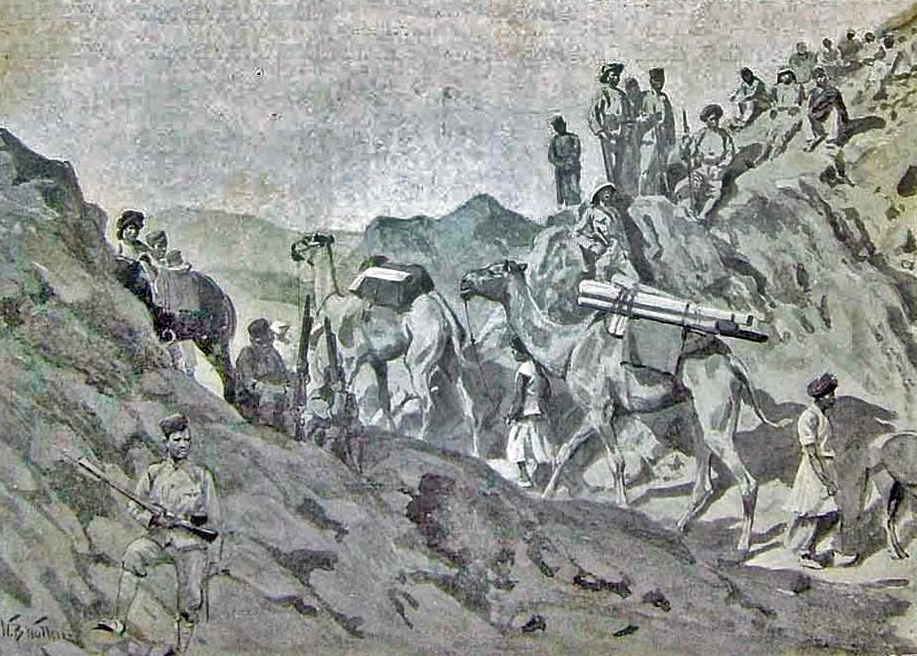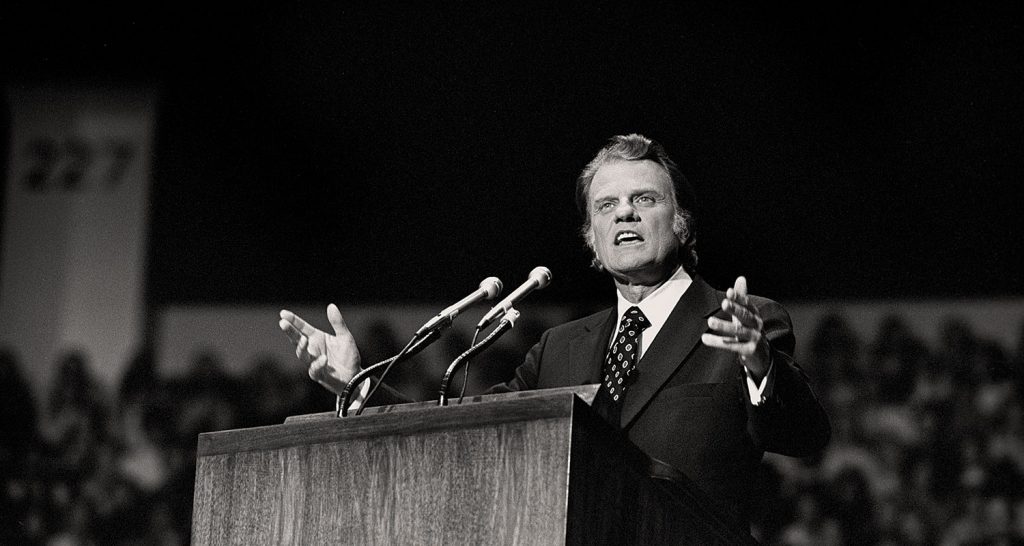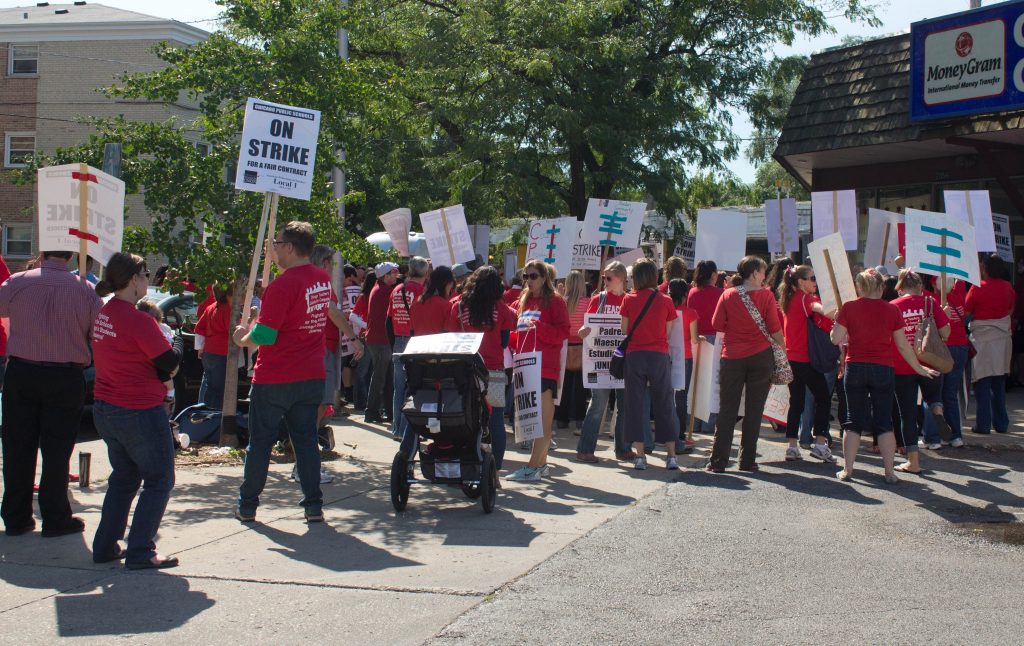Editor’s note: Here follows the tenth chapter of The Story of the Malakand Field Force: An Episode of Frontier War, by Winston S. Churchill (published 1898). All spelling in the original.
CHAPTER X: THE MARCH TO NAWAGAI
After considering such maps and information as to the nature of the country as were available, Sir Bindon Blood decided to enter the territories of the Mohmands by two routes. (1) The 3rd Brigade through the pass of Nawagai. (2) The 2nd Brigade over the Rambat Pass. This would sweep the country more thoroughly, and afford increased facilities for drawing supplies. As the 3rd Brigade had a greater distance to cover, it passed in front of the 2nd, and on the 12th of September, by a march of twelve miles, reached Shumshuk. The 2nd Brigade, which had hitherto been leading, moved by an easy stage of seven miles to Jar, and there camped within supporting distance.
The Headquarters staff was now transferred to the 3rd Brigade and marched with them. The road lay for the first five or six miles over the ground, which the cavalry had reconnoitered the day before. Again all were struck by the great array of castles on the Utman Khel side of the valley. Many eager spirits would have liked to stop and blow up some of these fine places. But the Government terms had been complied with and the columns moved slowly by, eyeing the forts, which were covered with the white and blue clad figures of their defenders, with a sour disdain.
After riding for a couple of hours, the staff halted for breakfast under a shady tree by the banks of a clear and rapid stream.
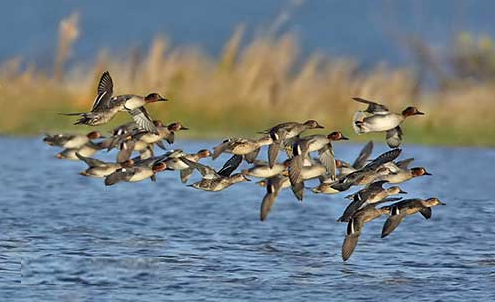
Two hundred yards away we observed a large flight of teal sitting tamely on the water. Every one became interested. Rifles there were in plenty; but where could a gun be found? Rigorous and hasty search was made. The political officer of the force, Mr. Davis, being consulted, eventually produced a friendly khan, who was the owner of a shot gun. After further delay this weapon was brought. The teal still floated unconcernedly on the water. A gun awakened no sense of danger. Shots in plenty they had heard in the valley, but they were not usually fired at birds. The exciting moment now arrived. Who should shoot? The responsibility was great. Many refused. At length Veterinary-Captain Mann, who was wounded a few days later at Nawagai, volunteered. He took the gun and began a painful stalk. He crawled along cautiously. We watched with suppressed emotion. Suddenly two shots rang out. They were to be the first of many. The men in the marching column 200 yards away became wide awake. The teal rose hurriedly and flew away, but four remained behind, killed or wounded. These birds we picked up with a satisfaction which was fully justified by their excellence that night at dinner.
Another mile or so brought us to the Watelai River, a stream about thirty yards broad, which flows into the Jandul, and thence into the Panjkora. Crossing this and climbing the opposite bank, the troops debouched on to the wide level plateau of Khar, perhaps ten miles across and sixteen in length. Standing on the high ground, the great dimensions of the valley were displayed. Looking westward it was possible to see the hills behind the Panjkora, the sites of the former camps, and the entrance of the subsidiary valley of the Jandul. In front, at the further end, an opening in the mountain range showed the pass of Nawagai. Towering on the left was the great mass of the Koh-i-mohr, or “Mountain of Peacocks”—a splendid peak, some 8000 feet high, the top of which is visible from both Peshawar and Malakand. Its name is possibly a corruption. Arrian calls it Mount Meros. At its base the city of Nysa stood in former times, and among many others fell before the arms of Alexander. Its inhabitants, in begging for peace, boasted that they conducted their government “with constitutional order,” and that “ivy, which did not grow in the rest of India, grew among them.” City, ivy, and constitutional order have alike disappeared. The mountain alone remains. A little to the northward the Ramlat Pass was distinguishable. On the right the smooth plain appeared to flow into the hill country, and a wide bay in the mountains, roughly circular in shape and nearly twelve miles across, opened out of the valley. The prominent spurs which ran from the hills formed many dark ravines and deep hollows, as it were gulfs and inlets of the sea. The entrance was perhaps a mile broad. I remember that, when I first looked into the valley, the black clouds of a passing storm hung gloomily over all, and filled it with a hazy half-light that contrasted with the brilliant sunshine outside. It was the Watelai, or as we got to call it later—the Mamund Valley.

The Khan of Khar met the general on the farther bank of the river. He was a tall, fine-looking man with bright eyes, bushy black whiskers and white teeth, which his frequent smiles displayed. He was richly dressed, attended by a dozen horsemen and mounted on a handsome, though vicious dun horse. He saluted Sir Bindon Blood with great respect and ceremony. Some conversation took place, conducted, as the khan only spoke Pushtu, through the political officer. The khan asserted his loyalty and that of his neighbour the Khan of Jar. He would, he said, do his utmost to secure the peaceful passage of the troops. Such supplies as they might need, he would provide, as far as his resources would go. He looked with some alarm at the long lines of marching men and animals. The general reassured him. If the forces were not interfered with or opposed, if the camps were not fired into at night, if stragglers were not cut off and cut up by his people, payment in cash would be made for all the grain and wood it was necessary to requisition.
The khan accepted this promise with gratitude and relief, and henceforth during the operations which took place at Nawagai and in the Mamund Valley, he preserved a loyal and honourable behaviour. To the best of his power he restrained his young bloods. As much as he was able, he used his influence to discourage the other tribes from joining the revolt. Every night his pickets watched our camps, and much good sleep was obtained by weary men in consequence. At the end of the fighting he was the intermediary between the Government and the Mamund tribesmen. And on one occasion he rendered a signal service, though one which should hardly have been entrusted to him, by escorting with his own retainers an ammunition convoy to the 2nd Brigade, when troops and cartridges were alike few and sorely needed. Had he proved treacherous in this instance the consequences might have been most grave. Throughout, however, he kept his word with the general, and that in the face of opposition from his own people, and threats of vengeance from his neighbours.
He on his part will not complain of British good faith. Although the fighting was continued in the district for nearly a month, not one of his villages was burnt, while all damage done to his crops was liberally compensated. He was guaranteed against reprisals, and at the end of the operations the gift of a considerable sum of money proved to him that the Sirkar could reward its friends, as well as punish its enemies.
The camel transport of the 3rd Brigade lagged on the road, and the troops, tired after their long march, had to wait in the blazing sun for a couple of hours without shelter until the baggage came up. At length it arrived, and we proceeded to camp as far as is possible without tents. Shelters were improvised from blankets, from waterproof sheets supported on sticks, or from the green boughs of some adjacent trees. Beneath these scanty coverings the soldiers lay, and waited for the evening.
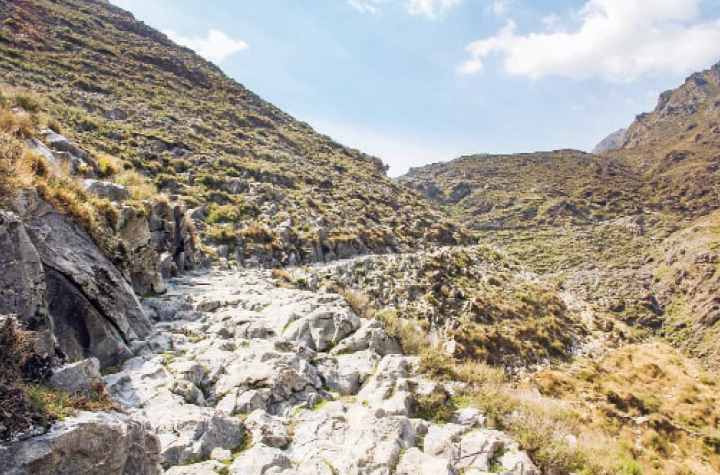
Every one has read of the sufferings of the British troops in having to campaign in the hot weather during the Indian Mutiny. September in these valleys is as hot as it is easy to imagine or elegant to describe, and the exposure to the sun tells severely on the British battalions, as the hospital returns show. Of course, since Mutiny days, many salutary changes have been made in the dress and equipment of the soldier. The small cap with its insufficient puggaree is replaced by the pith helmet, the shade of which is increased by a long quilted covering. The high stock and thick, tight uniforms are gone, and a cool and comfortable khaki kit has been substituted. A spine protector covers the back, and in other ways rational improvements have been effected. But the sun remains unchanged, and all precautions only minimise, without preventing the evils.
Slowly the hours pass away. The heat is intense. The air glitters over the scorched plain, as over the funnel of an engine. The wind blows with a fierce warmth, and instead of bringing relief, raises only whirling dust devils, which scatter the shelters and half-choke their occupants. The water is tepid, and fails to quench the thirst. At last the shadows begin to lengthen, as the sun sinks towards the western mountains. Every one revives. Even the animals seem to share the general feeling of relief. The camp turns out to see the sunset and enjoy the twilight. The feelings of savage hatred against the orb of day fade from our minds, and we strive to forget that he will be ready at five o’clock next morning to begin the torment over again.
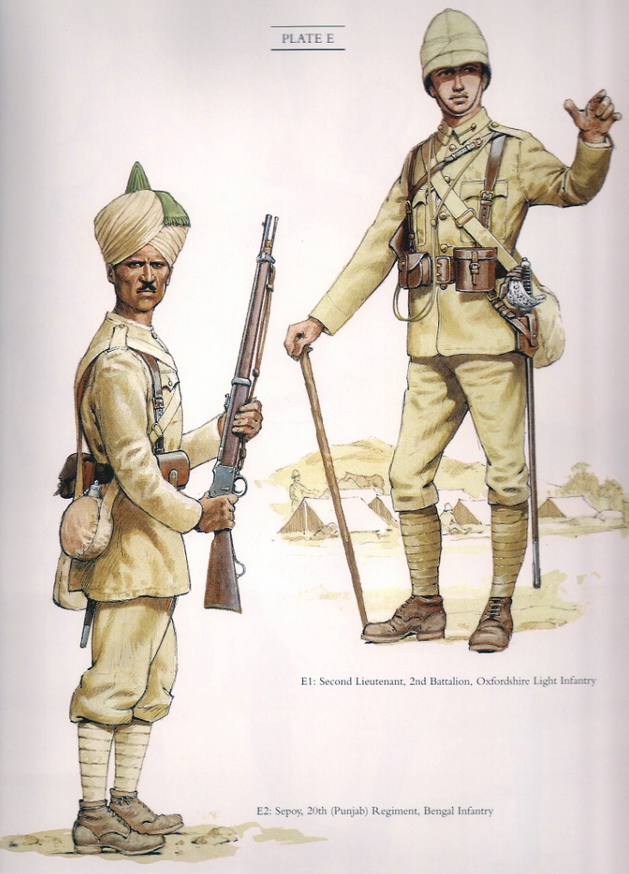
As there were still several days to spare before the Malakand Field Force was due to enter the Mohmand country, Sir Bindon Blood ordered both brigades to remain halted on the 13th: the 3rd Brigade at Shumshuk; the 2nd at Jar. Meanwhile two reconnaissances were to be sent, one to the summit of the Rambat Pass, and the other up the Watelai Valley.
The night of the 12th was the first occasion of “sniping,” since the advance against the Mohmands had begun. About half a dozen shots were fired into camp, without other result than to disturb light sleepers. Still it marked a beginning.
The reconnaissances started next morning. The general accompanied the one to the Rambat pass, to satisfy himself as to the nature of the unexplored country on the other side. Two companies of infantry were ordered to clear the way, and two others remained in support half-way up the pass. Sir Bindon Blood started at six o’clock accompanied by his escort, whose gay pennons combined, with the Union Jack of the Headquarters staff, to add a dash of colour to the scene. After riding for a couple of miles we caught up the infantry and had to halt, to let them get on ahead and work through the broken ground and scrub. A mile further it was necessary to dismount and proceed on foot. No opposition was encountered, though the attitude and demeanour of the natives was most unfriendly. The younger ones retired to the hills. The elder stayed to scowl at, and even curse us. The village cemetery was full of property of all kinds, beds, pitchers, and bags of grain, which the inhabitants had deposited there under the double delusion, that we wanted to plunder, and that in so sacred a spot it would be safe—were such our intention. In spite of their black looks, they were eventually all made to stand up and salute respectfully.
The climb was a stiff one and took at least an hour. But the track was everywhere passable, or capable of easily being made passable for mules. The general, trained and hardened by years of shooting of all kinds in the jungles, arrived at the top first, followed by Brigadier-General Wodehouse, and a panting staff. A fine view of the Ambasar Valley was displayed. It was of arid aspect. Villages in plenty could be seen, but no sign of water. This was serious, as information as to wells was unreliable, and it was desirable to see some tanks and streams, before allowing a column to plunge into the unknown dangers of the valley. After some consideration Sir Bindon Blood decided to modify the original plan and send only two battalions of the 2nd Brigade with one squadron over the pass, while the rest were to march to join him at Nawagai. We then returned, reaching camp in time for luncheon.
Meanwhile the reconnaissance up the Watelai or Mamund Valley had been of a more interesting nature. Two squadrons of the 11th Bengal Lancers, under Major Beatson, and with Mr. Davis, the political officer, were sent to put some pressure on the Mamunds, to make them carry out the terms agreed upon. They had promised to surrender fifty rifles. This they now showed no intention of doing. They had realised, that the brigades were only marching through the country, and that they had no time to stop, and they were determined to keep their arms as long as possible.
As the cavalry approached the first village, about 300 men gathered and, displaying standards, called on the Lancers to stop. An altercation ensued. They were given half an hour to remove their women and children. Then the squadrons advanced. The tribesmen, still menacing, retired slowly towards the hills. Then a small party came up and informed Major Beatson, that in the next village was a troop-horse, which had been captured in the fighting in the Swat Valley. This admission, that the Mamunds had been implicated in the attack on the Malakand, was sufficiently naive. The cavalry rode on to the village. The horse was not to be found, but the officious informers from the first village eagerly pointed out where it had been stabled. In consequence of this information, and to stimulate the tribesmen to carry out the original terms, Mr. Davis decided to make an example and authorised Major Beatson to destroy the house of the owner of the stolen property. This was accordingly done. As soon as the smoke began to rise, the tribesmen, who had waited, half a mile away, opened a dropping fire from Martini-Henry rifles on the cavalry. These, not wishing to engage, retired at a trot. They were followed up, but though the fire was well directed, the range was too great for accurate shooting and the bullets whizzed harmlessly overhead.
As the Lancers left the valley, an incident occurred which illustrates what has been said in an earlier chapter, and is characteristic of the daily life of the natives. The people of the first village had directed the attention of the cavalry to the second. Part of the second had been in consequence burnt. The inhabitants of both turned out to discuss the matter with rifles and, when last seen that night, were engaged in a lively skirmish. Apparently, however, they soon forgot their differences.
The rumour that the cavalry had been fired on preceded them to camp, and the prospects of some opposition were everywhere hailed with satisfaction. Many had begun to think that the Mohmand expedition was going to be a mere parade, and that the tribesmen were overawed by the powerful forces employed. They were soon to be undeceived. I watched the squadrons return. Behind them the Mamund Valley was already dark with the shadows of the evening and the heavy clouds that had hung over it all day. They were vastly pleased with themselves. Nothing in life is so exhilarating as to be shot at without result. The sowars sat their horses with conscious pride. Some of the younger officers still showed the flush of excitement on their cheeks. But they pretended excellently well to have forgotten all about the matter. They believed a few fellows had “sniped” at them; that was all.
But it was by no means all. Whatever is the Afghan equivalent of the “Fiery Cross” was circulated among the tribes. There was no time for them to gather to attack that night, and the situation of the camp in the open was unsuited to night firing. The other brigade was coming. They would wait. They therefore contented themselves with firing occasional shots, beginning while we were at dinner, and continuing at intervals until daylight. No one was hurt, but we may imagine that the tribesmen, who spent the night prowling about the nullahs, and firing from time to time, returned to their countrymen next morning boasting of what they had done. “Alone, while ye all slumbered and slept, in the night, in the darkness, I, even I, have attacked the camp of the accursed ones and have slain a Sahib. Is it not so, my brothers?” Whereupon the brothers, hoping he would some day corroborate a lie for them, replied, that it was undoubtedly so, and that he had deserved well of the tribe. Such is the reward of the “sniper.”
Early next morning the 3rd Brigade and three squadrons of the 11th Bengal Lancers moved on to Nawagai and crossed the pass without opposition. The general and Headquarters staff accompanied them, and we found ourselves in a wide and extensive valley, on the far side of which the Bedmanai Pass could be plainly seen. Here, at last, we got definite information of the Mohmands’ intentions. The Hadda Mullah with 1000 tribesmen had gathered to oppose the further advance. After all there would be a fight. In the evening Sir Bindon Blood, taking a squadron of cavalry, rode out to reconnoitre the approaches to the pass and the general configuration of the ground. On his return he sent a despatch to the Government of India, that he would force it on the 18th. The soldiers, especially the British troops, who had not yet been engaged, eagerly looked forward to the approaching action. But events were destined to a different course.
It was already dusk when we returned from the reconnaissance. The evening was pleasant and we dined in the open air. Still the valley was very dark. The mountains showed a velvet black. Presently the moon rose. I repress the inclination to try to describe the beauty of the scene, as the valley was swiftly flooded with that mysterious light. All the suitable words have probably been employed many times by numerous writers and skipped by countless readers. Indeed I am inclined to think, that these elaborate descriptions convey little to those who have not seen, and are unnecessary to those who have. Nature will not be admired by proxy. In times of war, however, especially of frontier war, the importance of the moon is brought home to everybody. “What time does it rise to-night?” is the question that recurs; for other things—attacks, “sniping,” rushes,—besides the tides are influenced by its movements.
Meanwhile, as at Nawagai, at a peaceful camp and a quiet dinner we watched the “silvery maiden” swiftly appear over the eastern mountains. She was gazing on a different scene eleven miles away, in the valley we had left.
The 2nd Brigade had marched that morning from Jar to the foot of the Rambat Pass, which it was intended to cross the next day. Brigadier-General Jefferys, in anticipation of this movement, sent the Buffs up to hold the Kotal, and camped at the foot with the rest of his force. The situation of the camp, which had been adopted with a view to the advance at daybreak, favored the approach of an enemy. The ground was broken and intersected by numerous small and tortuous nullahs, and strewn with rocks. Any other site would, however, have necessitated a long march the next day, and no attack was thought likely.
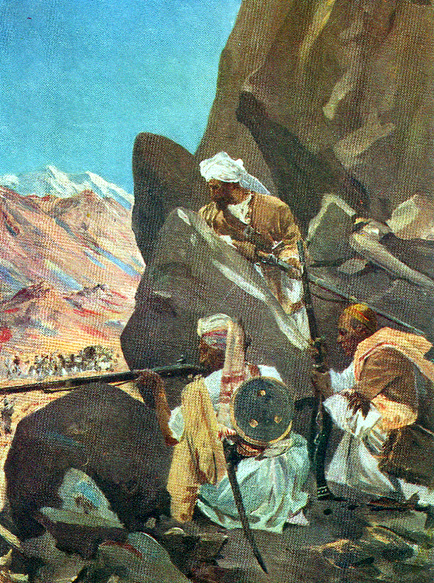
At 8.15, as the officers were finishing dinner, three shots rang out in the silence. They were a signal. Instantly brisk firing broke out from the nullahs on the face of the square occupied by the Guides Infantry. Bullets whistled all about the camp, ripping through the tents and killing and wounding the animals.
The Guides returned the fire with steadiness, and, as the shelter trench they had dug in front of their section of the line was higher than at other parts, no officers or men were hit. At ten o’clock a bugler among the enemy sounded the “Retire,” and the fire dwindled to a few dropping shots. All were congratulating themselves on a termination of the event, when at 10.30 the attack was renewed with vigour on the opposite side of the camp, occupied by the 38th Dogras. The enemy, who were largely armed with Martini-Henry rifles, crept up to within 100 yards of the trenches. These were only about eighteen inches high, but afforded sufficient cover to the soldiers. The officers, with a splendid disregard of the danger, exposed themselves freely. Walking coolly up and down in the brilliant moonlight they were excellent targets. The brigadier proceeded himself to the threatened side of the camp, to control the firing and prevent the waste of ammunition. A good many thousand rounds were, however, fired away without much result. Several star shells were also fired by the battery. The ground was so broken that they revealed very little, but the tribesmen were alarmed by the smell they made, thinking it a poisonous gas. The officers were directed to take cover, but the necessity of sending messages and regulating the fire involved a great deal of exposure. And to all who showed above the trench the danger was great. Captain Tomkins of the 38th Dogras was shot through the heart, and a few minutes later the adjutant of the regiment, Lieutenant Bailey, was also killed. In assisting to take these officers to the hospital, where a rough shelter of boxes had been improvised, Lieutenant Harington, an officer attached to the Dogras, received a bullet in the back of the head, which penetrated his brain and inflicted injuries from which he died subsequently. All tents were struck and as much cover as could be made from grain-bags and biscuit-boxes was arranged. At 2.15 the firing ceased and the enemy drew off, taking their killed and wounded with them. They had no mind to be surprised by daylight, away from their hills. But they had already remained a little too long.
As soon as the light allowed, the cavalry squadron under Captain Cole started in pursuit. After a long gallop down the valley, he caught one party making for the mountains. Charging immediately, he succeeded in spearing twenty-one of these before they could reach the rocks. The squadron then dismounted and opened fire with their carbines. But the tribesmen turned at once and made a dash in the direction of the led horses. A sowar was wounded and a couple of horses killed. The cavalrymen, threatened in a vital point, ran hurriedly back, and just got into their saddles in time. In the haste of mounting four horses got loose and galloped away, leaving six dismounted men. Captain Cole placed one of them before him on the saddle, and the troopers followed his example. The squadron thus encumbered, retired, and after getting out of range, succeeded in catching their loose horses again. The enemy, seeing the cavalry mounted once more, took refuge on the hills. But it was evident, they were eager for fighting.
The casualties in the night attack of Markhanai were as follows:—
BRITISH OFFICERS.
Killed—Capt. W.E. Tomkins, 38th Dogras.
" Lieut. A.W. Bailey, 38th Dogras.
Died of wounds—Lieut. H.A. Harington, attd. 38th Dogras.
NATIVE OFFICER.
Wounded......... 1
NATIVE SOLDIERS.
Killed. Wounded.
No.8 Mountain Battery.... 1 1
35th Sikhs....... 1 3
38th Dogras....... 1 0
Guides Infantry...... 0 1
Followers....... 2 2
Total Casualties, 16; and 98 horses and mules.
Meanwhile, the 3rd Brigade had passed a tranquil night at Nawagai. Next morning, however, at about six o’clock, a message was heliographed from the Buffs on the Rambat Pass, to the effect that an attack had been made on General Jeffreys’ camp; that heavy firing had continued all night, and that several officers were among the casualties. This news set every one agog. While we were breakfasting, a native officer and ten sowars of the 11th Bengal Lancers arrived at speed with full details: six hours’ fighting with the Mamunds: three officers killed or mortally wounded; and nearly a hundred animals hit. In consequence of this information, Sir Bindon Blood cancelled the orders for the passage of the Rambat Pass and instructed General Jeffreys to enter the Mamund Valley and thoroughly chastise the tribesmen.
I was allowed to go back with the native officer’s escort to the 2nd Brigade, in order to witness the operations which had been ordered. Judiciously selecting a few things, which could be carried on the saddle, of which the most important were a cloak, some chocolate and a tooth-brush, I hurried after the escort, who had already started, and overtook them just as they had got through the pass of Nawagai.
For the first six miles the road lay through a network of deep ravines, through which the troopers picked their way very carefully. It would have been a bad place for a small party to have been attacked in, but fortunately, though several armed tribesmen were seen, they did not fire at us. At one point the route lay through a deep nullah, along which some of the assailants of the night before had retired. These were probably from the Charmanga Valley. They had evidently suffered losses. Several native beds on which wounded men had been carried lay scattered about. At this place they had probably found some oxen, to which they had transferred their bodies. At length we got clear of the difficult ground, and entering the smooth plain of Nawagai looked out eagerly for the brigade. Seven miles away across the valley was a long brown streak. It was the troops marching from Markhanai to the entrance of the Mamund Valley. The smoke of five burning villages rose in a tall column into the air—blue against the mountains, brown against the sky. An hour’s riding brought us to the brigade. Every one was full of the events of the night, and all looked worn from having had no sleep. “You were very lucky to be out of it,” they said. “There’s plenty more coming.”
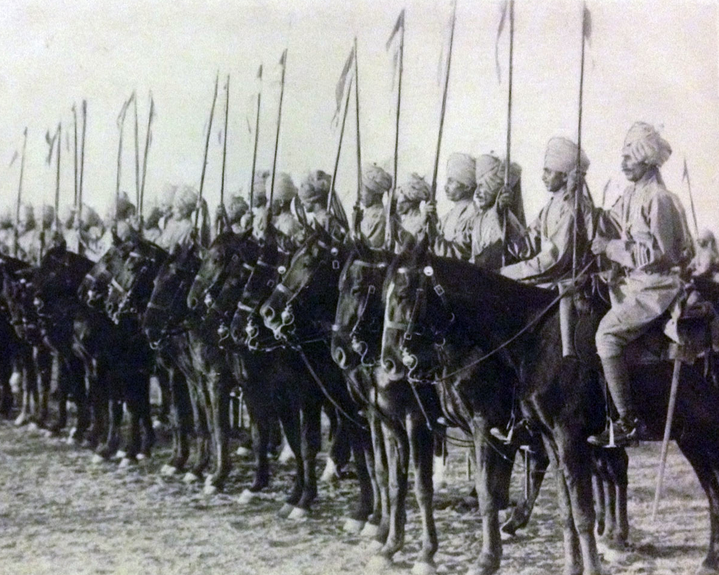
The cavalry soon returned from their pursuit. The points of their lances were covered with dark smears. A sowar displayed his weapon proudly to some Sikhs, who grinned in appreciation. “How many?” was the question asked on all sides. “Twenty-one,” replied the officer. “But they’re full of fight.”
Orders were now issued for the brigade to camp on the open ground near Inayat Kila, which, translated, means Fort Grant, and is the name of a considerable stone stronghold belonging to the Khan of Khar. Although the troops were very tired from their march, and the fighting of the preceding night, they began entrenching with alacrity. Besides making an outer wall to the camp, about three and a half feet high, everybody scratched a little hole for himself. In these occupations the afternoon passed.
The Buffs came in at sunset, having marched from the top of the Rambat Pass. They had heard the firing of the night and were disappointed at having been absent. It was “just their luck,” they said. During the Chitral campaign of 1895, they had had the ill-fortune to miss every engagement. It would be the same now. All tried to reassure them. As soon as it was dark an attack was probable.
A dropping fire began after dinner from the great nullah to the north of the camp, and all lights were put out and the tents struck. Every one retired to the soup-plate he had scooped in the earth. But no attack was made. The enemy had informed the political officer through the friendlies, that they were weary and would rest that night. They sent a few “snipers” to fire into the camp, and these kept up a desultory fusillade until about two o’clock, when they drew off.
Those who had been deprived of their rest the night before soon dropped off to sleep, in spite of the firing. Others, not overpowered by weariness, found no occupation but to lie in their holes and contemplate the stars—those impartial stars which shine as calmly on Piccadilly Circus as on Inayat Kila.

